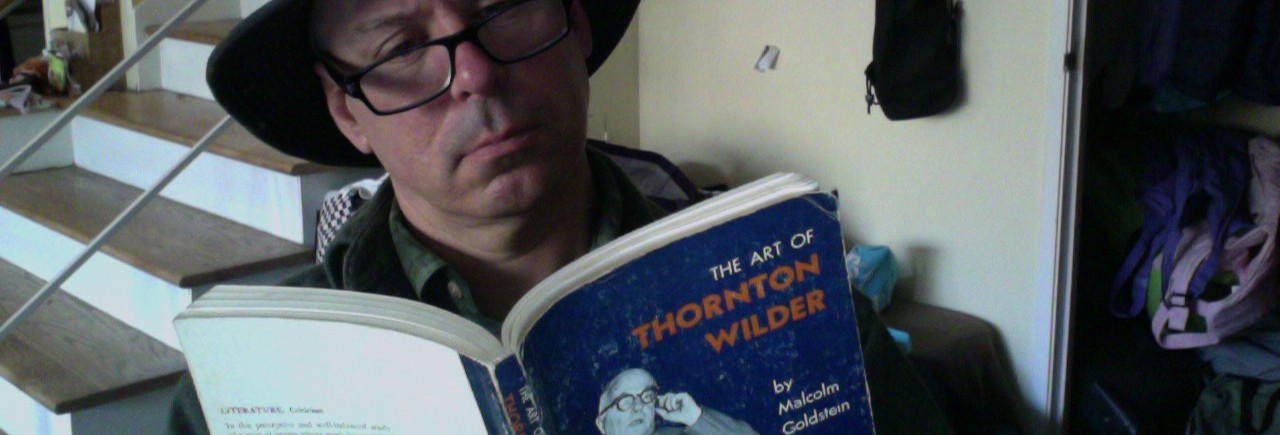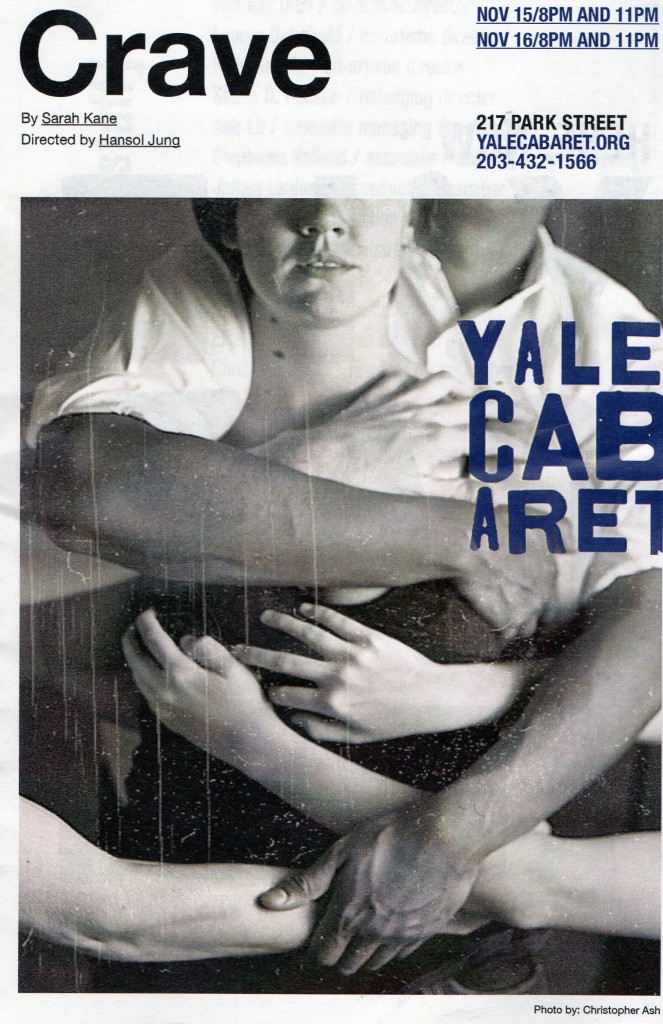Crave
Through Nov. 16 at the Yale Cabaret, 217 Park Street, New Haven. (203) 432-1566, www.yalecabaret.org
By Sarah Kane. Directed by Hansol Jung. Dramaturg: Kee-Yoon Nahm. Producer Sally Shen. Set Designer: Samantha Lazar. Assistant Set Designer/ Tech Consultant: Andrew Freeburg. Costume Designer: Hunter Kaczorowski. Lighting Designer: Elizabeth Mak. Sound Designer: Gahayae Ru. Projection Designer: ni Wen. Stage Manager: Emily DeNardo. Assistant Director: Gabrielle Hoyt-Disick. Performed by Helen Jaksch (M), Taylor Barfield (A), David Clauson (B) and Ashley Chang (C).
Sarah Kane wrote Crave under a pseudonym, Marie Kelvedon, specifically so that people wouldn’t think of it as a Sarah Kane play.
The playwright, known for conjuring overwhelmingly brutal, violent and sexually licentious images onstage, deliberately held back in this script, letting the text lead instead. She used a similar style, and her own name again, for her next and final play, 4.48 Psychosis (which was staged at the Yale Cabaret in 2010).
Kane killed herself in February 1999. I happened to be in England when her death was announced. It made the front pages of most of the London papers. She was a writer of special gifts, to be appreciated by a special subset of theatergoers. But she was also a well-known and popular playwright whose works were done at major London theaters (including The Royal Court, where Kane’s Cleansed was the grandest and most expensive production that theater had yet attempted) and broadcast on BBC TV. Her boundary-breaking work (labeled, by those who like to label things, as “in-yer-face”) was not to everyone’s taste, but a whole lot of people knew who she was. That’s now true of Kane’s reputation on college campuses, where her works are regularly accessed by energetic, envelope-pushing students in the thrall of her incendiary scenarios. At Yale alone, you could have caught all of Kane’s canon within the last decade or so, some of them three or four times. She’s even more popular with the undergrad theater troupes than she is with the School of Drama types.
I think the Yale Cabaret might WANT this production of Crave to be thought of as a Sarah Kane play, not a solid if wordy script which survives on its own merits. Director Hansol Jung clearly wants to shock and disturb in the accepted Kane vein. Tellingly, Jung and the cast reframe what is usually interpreted as a play of equivalent voices that don’t necessarily interact (not unlike a Peter Handke presentation) into a more character-based drama where one character (“M,” interpreted here as a writer, and played by Helen Jaksch) is beset by the others. This sense of the play is more in keeping with such harrowing Kane works as the myth-busting Phaedra’sLove, in which a vaguely heroic figure runs a gauntlet of emotional and physical assaults.
Kane doesn’t provide cues to how to stage Crave—literally, there are no stage directions—and this concept is as justifiable as any. Yet the script is not constructed to support and sustain a narrative structure. And without the transcendently bleak mood and consistent tone of other Kane works, it doesn’t build to anything awe-inspiringly dark.
This production doesn’t work as either a Sarah Kane play (for those looking to be disturbed) or a Marie Kelvedon play (for the hard-won mastery of a new open-ended word-bound style). The young actors have taken a particularly tough road. They seem to want each line to mean something individually, so they strut and prance and overpronounce certain words and behave like each sentence is a stand-alone one-liner. And they miss a bigger picture that could have come from simply streaming the words more evenly and letting the audience access them without all that exhausting leaping about.
For a play which backtracks on the psychosexual abuse of earlier Kane works, we still get lots of simulated sex, though it’s more of the writhing-solo-body variety than the wrestling matches other Kane plays can become. (Mark Ravenhill, Kane’s friend and fellow playwright to whom she dedicated Crave published version, described her play Blasted as “language and incident … squeezed into a poetic whole”).
The body movements here are illustration, not distinct from the dialogue. And that dialogue ranges from personal confessions to direct quotes from modern British poetry to allusions to biblical scripture and mythology. There’s no real narrative thrust, though some stray thoughts do connect during the short work into more complex statements.
I love that the actors chose not to go with hokey British accents, using their strong plain speaking voices instead. But it raises another problem, since the more realistic stretches of dialogue are peppered with words like “fag” (as in cigarette) and “arse” (as in ass), so instead of sounding natural these tracts sound as distant and unreal as the ancient or poetic bits.
Nothing rises to the promised sense of provocation, of self-realization, of onstage danger.
Which is fine with me. I didn’t need my soul to be battered at 11 p.m. last night. I was perfectly content to hear a clearly spoken collage of texts collected from a bemusing range of sources. I expect the four actors—a racially and tonally diverse ensemble that seems as intent on not connecting as connecting—may have gotten more out of this exercise than many audience members. I noticed lots of rolling eyes and shrugs when I attended, and even saw some downright scowls of distaste over moments which meant to shock and dismay but which came off to some as simply over-the-top and crass.
This particular production lacked the fluidity and stagecraft and urgency which I’ve come to expect from youthful productions of Sarah Kane plays. But if you follow the words of Crave and not the oft-distracting fill-in actions, there’s lots to take in.
Even when Sarah Kane doesn’t blister, she still gets under your skin.

